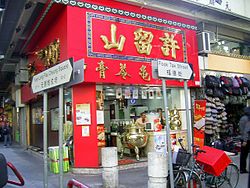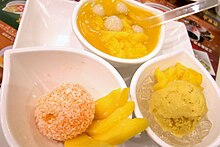Hui Lau Shan
You can help expand this article with text translated from the corresponding article in Chinese. (August 2012) Click [show] for important translation instructions.
|
| Hui Lau Shan | |
|---|---|
 | |
 The chain's first shop at Yuen Long | |
| Restaurant information | |
| Established | 1960 |
| Closed | November 2021 (Hong Kong stores) |
| Owner(s) | Royal Dynasty International Holding Company[1] |
| Food type | Desserts: tong sui, nuomici, snacks |
| Country | |
| Website | www |


Hui Lau Shan (Chinese:
The chain was acquired by Royal Dynasty International Holding Company, a mainland Chinese catering chain in 2015 for 524 million RMB.[1] Its Hong Kong business was filed for winding-up in 2020, with Hui Lau Shan citing declined customers attributed to the 2019–20 Hong Kong protests.[4] A settlement was subsequently reached whereby the winding-up petition was withdrawn in July 2020.[5]
History
[edit]Hui Lau Shan was founded by Hui Chi-Yuk in the 1960s. The chain's first shop opened in Yuen Long, New Territories, and started as an herbal outlet selling turtle jelly (
In July 2007, the third-generation owner of Hui Lau Shan sold the Hong Kong franchise to the Malaysian firm Navis Capital Partners.[9] Owing to disputes by the new Malaysian shareholder over an existing franchising agreement signed between Hui Lau Shan Hong Kong and Hui Lau Shan Guangzhou, the latter was forced to change its brand name to "Tang Lau Shan" (Chinese: 鄧
Liquidation
[edit]This section is empty. You can help by adding to it. (June 2024) |
End of business
[edit]This section is empty. You can help by adding to it. (June 2024) |
References
[edit]- ^ a b c d Siu, Jasmine (11 March 2020). "Hong Kong dessert chain Hui Lau Shan served with winding-up petition in High Court amid accusations of unpaid rent". South China Morning Post. Retrieved 2 May 2020.
- ^ Hang, Kristie (26 August 2019). "Hong Kong's most famous mango dessert shop opens in Irvine". Eater LA. Eater Los Angeles. Retrieved 2 May 2020.
- ^ Quek, Eunice (17 January 2020). "Mango dessert specialist Hui Lau Shan back in Singapore". The Straits Times. Retrieved 2 May 2020.
- ^ QZ (13 March 2020). "
許 留山 欠 租被入 稟高院 清 盤 去年 有 至 少 12間 香港 分 店 結 業 " (in Chinese (Hong Kong)). Hong Kong Business Times. Retrieved 2 May 2020. - ^ "
許 留山 公司 被 呈 請清盤 撤銷官 笑 言 仍可享 用 「許 留山 」食品 " (in Chinese (Hong Kong)). Hong Kong Economic Times. 22 July 2020. Retrieved 28 April 2021. - ^ Evans, Grant; Maria Tam (1997). Hong Kong: The Anthropology of a Chinese Metropolis. University of Hawaii Press.
- ^ "Hui Lau Shan Official Website". Retrieved 2 May 2020.
- ^ Yang, Jeff (27 April 2006). "ASIAN POP / Dessert Storm". SF Gate. SFGATE. Retrieved 16 March 2017.
- ^ Sun, Celine (25 March 2014). "Dessert chain offers place to chill out | South China Morning Post". archive.is. South China Morning Post. Archived from the original on 25 March 2014. Retrieved 4 May 2020.
- ^ "
廣州 許 留山 變 鄧留山 ". Apple Daily 蘋果日報 (in Chinese). Apple Daily Hong Kong. Retrieved 4 May 2020.[permanent dead link]
Further reading
[edit]- Ma, Jess (6 Aug 2022). "End of an era? 5 Hong Kong food and beverage icons that have bowed out". South China Morning Post. Retrieved 21 Jun 2024.
- Standard, The (18 Nov 2021). "The end of an era – Hui Lau Shan to close its doors this month". The Standard. Retrieved 21 Jun 2024.
- "〈
好 食 〉重 遇 已 消失 的 香港 品 牌 :英國 許 留山 多 芒 小 丸子 ". Now新聞 (in Traditional Chinese). 19 Nov 2023. Retrieved 21 Jun 2024.
